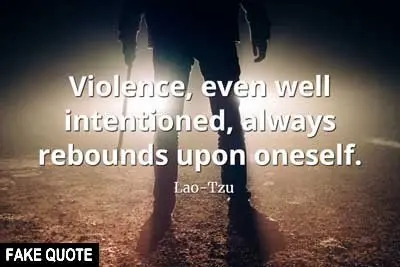Fake Lao Tzu Quote
"Violence..."

This is NOT a quote from Tao Te Ching:
"Violence, even well intentioned, always rebounds upon oneself."
The Book
The Taoism of Lao Tzu Explained. The great Taoist philosophy classic by Lao Tzu translated, and each of the 81 chapters extensively commented. Click the image to see the book at Amazon (paid link).
More about the book here.
|
Lao Tzu did not speak of violence as such, but he was clear about his dislike of armed forces and war, and pointed it out more than once in Tao Te Ching. Chapter 31 starts (my version):
Weapons are ominous tools.
They are abhorred by all creatures.
Anyone who follows the Way shuns them.
In chapter 30 Lao Tzu described his reason for condemning war further. Simply put, the price is too high for both the loser and the winner:
Those who advice the ruler on the Way,
Do not want the world subdued with weapons.
Such deeds bring on retaliation.
Thorn bushes grow where armies have camped.
Battles are followed by years of famine.
|
90 of the most spread false Lao Tzu quotes, why they are false and where they are really from. Book by Stefan Stenudd. Click the image to see the book at Amazon (paid link).
More about the book here.
|
This is actually the chapter from which the quote discussed here is taken, but in the widely popular Tao Te Ching version by Stephen Mitchell from 1988. His rendering of the above part, ending with the quote, reads:
Whoever relies on the Tao in governing men
doesn't try to force issues
or defeat enemies by force of arms.
For every force there is a counterforce.
Violence, even well intentioned,
always rebounds upon oneself.
His whole interpretation of this part of chapter 30 is confusing. He focused on the mutual losses in battle, but Lao Tzu worried more about what it did to the land and the people. His interpretation is not shared by other versions. To give another example, here is James Legge's from 1891 (page 72):
He who would assist a lord of men in harmony with the Tâo will not assert his mastery in the kingdom by force of arms. Such a course is sure to meet with its proper return.
Wherever a host is stationed, briars and thorns spring up. In the sequence of great armies there are sure to be bad years.
Mitchell missed the powerful imagery of the thorns and the dire consequence of bad years and famine, and in particular he neglected the suffering of all those who were not soldiers in the war. In every war, they tend to be the majority.
For more about Stephen Mitchell and his version of Tao Te Ching, see the chapter A good traveler has no fixed plans.
Stefan Stenudd
September 22, 2020.
There are many more fake Lao Tzu quotes examined on this website.
Click the header to see a list of them.
Click the header to read a "fake" interview with Stefan Stenudd, the author of
Fake Lao Tzu Quotes.
My Taoism Books
Click the image to see the book at Amazon (paid link).
The Taoism of Lao Tzu Explained. The great Taoist philosophy classic by Lao Tzu translated, and each of the 81 chapters extensively commented.
More about the book here.
The Ancient Wisdom of the Tao Te Ching by Lao Tzu. 389 quotes from the foremost Taoist classic, divided into 51 prominent topics. Click the image to see the book at Amazon (paid link).
More about the book here.
Erroneous Tao Te Ching Citations Examined. 90 of the most spread false Lao Tzu quotes, why they are false and where they are really from. Click the image to see the book at Amazon (paid link).
More about the book here.
|
My Other Websites:
The 64 hexagrams of the Chinese classic
I Ching and what they mean in divination. Try it online for free.
The ancient Chinese life energy
qi (
chi) explained, with simple instructions on how to exercise it.
The many ancient and modern life force beliefs all over the world explained and compared.
Other Books by Stefan Stenudd
Click the image to see the book at Amazon (paid link).
The Greek philosophers and what they thought about cosmology, myth, and the gods.
The life energy
qi (also
chi or
ki) explained, with exercises on how to awaken, increase and use it.
Basic concepts of the peaceful martial art. Aikido principles, philosophy, and fundamental ideas.
Qi, prana, spirit, ruach, pneuma, and many other life forces around the world explained and compared.
Jungian theories on myth and religion examined, from Carl G. Jung to Jordan B. Peterson.
About me
I'm a Swedish author and aikido instructor. In addition to fiction, I've written books about Taoism and other East Asian traditions. I'm also an historian of ideas, researching ancient thought and mythology. Click the image to get to my personal website.

 Tao Te Ching
Tao Te Ching Now it's a book, too!
Now it's a book, too! Tao Quotes
Tao Quotes Cosmos of the Ancients
Cosmos of the Ancients Qi — Increase Your Life Energy
Qi — Increase Your Life Energy Aikido Principles
Aikido Principles Life Energy Encyclopedia
Life Energy Encyclopedia Archetypes of Mythology
Archetypes of Mythology Stefan Stenudd
Stefan Stenudd